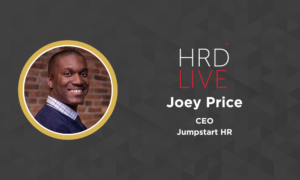What is HR’s role in promoting ethical practice in organisations?
- 7 Min Read
How has our concept of what is ethically acceptable in the workplace changed, and what is HR’s role in upholding ethical behaviour in an ever-changing workplace? Gary Cookson investigates.
- Author: Gary Cookson
- Date published: Oct 7, 2019
- Categories

In this article I’m going to explore whether HR has a strong enough role within organisations to have an effect on ethical behaviour.
Its something that is close to my heart, as I often try to speak out about such things where I can – I think, as the CIPD say often, work should be a force for good but we know that it often isn’t that way.
Very regularly, too regularly, we see stories of unethical behaviour in organisations and we might tut to ourselves or pass a few comments to our peers about it, but not often enough do we actually do anything more proactive or try to have conversations in the workplace about ethics.
Look around you in your workplace – you’ll see items of stationery that belong to the organisation. Now imagine you see a colleague slipping a pen into their pocket and walking out with it – would you stop them, or say something to them or anyone else?
Probably not – after all, its just a pen, and the organisation has hundreds at least – they may not even notice one is missing.
But what about if you see the same colleague do this every day for a year? If that changes your view of the behaviour, why is that?
What about if you’re queuing for your morning coffee on the way to work and you witness a customer sexually harassing one of the staff? Would you say something there?
Probably – and the nature of the unethical behaviour has changed your desire to act – but there are plenty of people who’d have the same reaction to one company pen going missing, and of course legally they’d be right.
But ethically, there’s no easy way to define what one workplace finds acceptable without having open and transparent conversations about what I’ll call “borderline” unethical behaviour. What are the types of situations that your staff, and in particular your leaders, encounter where they could make the “wrong” kind of decision – one that’s borderline unethical?
One of the key roles for HR is to identify these situations and discuss them with leaders and staff BEFORE they happen, and to establish codes of ethical conduct that give guidance to those faced with such situations.
You may have noticed the controversy earlier this year surrounding Leeds United FC’s manager Marcelo Bielsa and his involvement in the “spygate” drama.
You can read more about it here, but this involved Bielsa sending a person to spy on Derby County, a rival club, whilst they were training ahead of playing Leeds, and being caught whilst doing so. He attempted to avoid the controversy by first apologising, taking sole responsibility and exonerating Leeds, and explaining that in his own country this was normal behaviour (which plenty of people corroborated), and then explaining in detail how he works and how he has done this frequently in his time as Leeds manager.
There were, from Derby mainly but also others, predictable and understandable complaints that although there was no rule against the spying, it was unethical and unfair.
Despite football being a unique industry, this COULD happen in the workplace. It’s likelihood of happening, and our awareness of unethical practices via media coverage, are reasons why the CIPD have placed ethics more prominently in the new Profession Map and encourage HR professionals to champion good working practices and tackle poor leadership and cultures that give rise to unethical behaviour.
Part of the problem with that though is, akin to football, if there is no firm agreement on what ethical behaviour is or isn’t, it’s difficult to take action at first. Using Bielsa as an example, he seems to have had genuinely no idea what he was doing was wrong, but does seem to understand the prevailing culture now and to have committed not to do it again.
You could say Bielsa was naïve and he ought to have known all of this after a while in the job and country but also that someone in Leeds management, maybe in HR, hadn’t done enough to establish what their views of ethics are and now are paying the price.
There’s no right and wrong here but what does need to happen is conversations about it to establish internal expectations, and HR should be leading those.
I’m contemplating whether Bielsa’s actions were indeed unethical. They ‘probably are’ but when the furore died down, it appeared a storm in a teacup that really didn’t seem to offend most people. We’ve learned from history that accepted norms often change. What was once acceptable is now unacceptable and the reverse the same. Could this be one of those situations, where we need to step back and re-evaluate what ‘unethical’ really means?”
But just because a person may have done something considered acceptable elsewhere, doesn’t mean it is considered acceptable in another organisation. That said, a person shouldn’t be unfairly criticised for making a very honest, if naïve, judgement call if no rules are broken and no one gets hurt.
Or should they? Bielsa clearly knew he may face criticism for it, because he kept his actions hidden from his employer.
That, more than anything else, if I were in HR at Leeds United, would be the thing I’d be talking to Bielsa about.
Another thing to consider is whether if, there’s no rule or law against it, that makes an action or behaviour acceptable? In Bielsa’s case, no one got hurt and it wasn’t against the law or any rule in professional football. But does that make it OK? I’m not so sure.
I think a key role for HR professionals is to ask the right questions. I’m not so sure we have answers, but we can at least encourage debate and, where we see unethical behaviour, we ought to challenge whether it is right or not, and in my view it doesn’t matter if the behaviour may be legal – it could be considered our duty (but not ours alone) to raise awareness of such organisational grey areas.
If and when we in HR see anything we ourselves consider unethical or improper, let alone illegal, I feel we have a responsibility to speak up. Otherwise, if we don’t, lessons won’t be learnt and the unethical behaviour could continue and intensify.
I’m fairly certain this is why ethics is more prominent in the CIPD Profession Map. It was also at the heart of a talk by John Amaechi at #cipdACE in November 2018 which stuck with me, about us in HR being able to change organisations no matter if we are just one lone voice.
That’s a good thing if it helps those people review their moral code, and it’s something all of us in HR can do easily – speak out on such things, hold a mirror up to organisations in general and hope that just one person sees it and begins to think differently about how they lead, behave or treat other people. Even if we don’t work for an organisation that we see doing questionable things, we could consider that the people within it are not confident in speaking out, like in Leeds United, and do it for them.
Slowly, surely, we CAN change the world.









